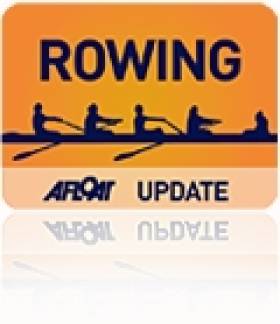Displaying items by tag: Lagan Scullers'
# ROWING: The Rowing Ireland talent identification programme run by Nathan Adams in Belfast provided the fastest female and male single scullers at the Lagan Scullers’ Head of the River on Saturday. Up-and-coming talents Gareth McKillen and Bridget Jacques topped the rankings. A Belfast Boat Club/RBAI composite coxed quadruple scull was the fastest crew of the day.
Lagan Sculler’s Head of the River, Belfast, Saturday (Selected Results)
Race One: 1 Bann women’s senior quadruple sculls 12:39.8, 2 Belfast BC women sen quad 12:41.8, 3 RBAI junior single sculls (G McKillen) 13:03.1, 4 BBC/Portora masters double sculls 13:03.8, 5 BBC senior single (Wray) 13:05.9, 6 Lagan sen single (Darby) 13:06.3; 9 Portadown nov single (McKeown) 13:34.1; 15 Bann wom nov coxed quad 14:02.6.
Race Two: BBC/RBAI men sen quad 11:04.5, 2 Lagan Scullers’ men sen quad 11:46.9, 3 Methodist College jun 18A double sculls 12:38.9, 4 Lagan Scullers’ Masters single (Darby) 13:03.7, 5 RBAI jun 16 coxed quad 13:04.7, 6 Coleraine AI double sculls 13:08.1; 8 Portadown inter single (McKeown) 13:30.4; 9 Bann women’s sen double 13:36.0, 15 Bann women’s jun 16 coxed quad 14:16.7.
Race Three: 1 Methodist College jun 18A quad 11:53.8, 2 Coleraine AI jun 18B coxed quad 12:32.8, 3 Methody quad (time only) 12:42.1, 4 BBC/Lagan Scullers’ quad (mixed, time only) 12:54.5, 5 Methody women’s jun 18A quad 13:29.4, 6 Belfast BC women’s sen single (B Jacques) 13:49.6; 8 Bann women’s jun 16 double 14:13.8; 16 BBC women’s nov single (Turner) 14:50.5; 17 Portadown women’s jun 18A quad 14:57.6.





























































